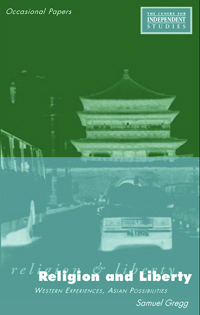
The once fashionable notion that ‘God is dead’ is certainly belief by the facts of increasing religious belief and practice throughout most of the world. Anyone, then, who values the free society, be they European or Asian, religious or otherwise, has to think seriously about what this may mean for the proliferation of liberty throughout the globe.
In this CIS Occasional Paper, Samuel Gregg examines religion and its effects upon liberty in the West, before speculating on what such experiences suggest about religion’s potential impact upon the growth of freedom throughout Asia. Christianity, he maintains, played a vital role in developing some of the central ideas and institutions that underpin liberty in the West. At the same time, Gregg argues that the links between church and state that persisted in the West until this century had largely negative consequences for civil and religious liberty. Against this background, Gregg examines Islam, Confucianism, and liberty in East Asia, and concludes that there is a need to facilitate a constructive dialogue between East Asian religious thought and the ideas underlying the free society. Not only does this require openness from religious intellectuals and leaders in East Asia, but also much cultural sensitivity on the part of westerners.










